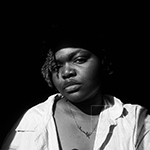Big sallah, small sallah
Our eid celebrations unleashed things I grew to crave: happiness, ease, my parents’ attention and the ability to breathe—almost as though the surge in joyful emotions softened our often-stiff air, miraculously making it easier to take in. I needed more than anything to feel as air, both light and easily swayed, as I often felt as deeply rooted as century old trees. The change in atmosphere exaggerated how much of a shadow I was in my daily life. I only sparkled during Eid. My voice morphed into an entity of its own, I could feel a thrumming beneath my skin, an excitement in the way I walked, a hopefulness that this happiness might stay. My sibling and I fell into the habit of re-naming things, especially if we thought their names didn’t do their meanings enough justice. We decided for our Eid celebrations to be christened according to scale, which led to Big Sallah’s title being coined due to the extravagance it required; Small Sallah just required less. My family, along with my uncle’s and the other Muslim families, would litter our compound with rams when Big Sallah reared its costly head. I remember, one year, getting hurt by one of the rams I had befriended. I’d had an especially soft spot for this ram, but after that affair, I wanted so badly to taste it and revel in how good it tasted.
Waking up to the smell of burning firewood on Eid morning was similar to drinking water after an indication of thirst. My mother would rush into our room, attempting to wake us while simultaneously checking things off in her head, my questions going unanswered because there was quite a lot to be done. My sibling and I would wake up excited, though tired from the previous night’s restlessness—sleep evading us due to our rollercoaster of emotions. We would carefully wear our newly-made lace over freshly done hair, slight headaches here and there until the tensions came undone. We would go into the compound-where the party was happening-in search of our dad, wait for his exclamations about how good we looked, try to get a glimpse of the food being cooked and rams being slaughtered. Sometimes there’s music going, money being gifted to children, people looking to buy more plastic chairs, cousins hoping to outdo the other, mothers and aunties setting up camp in kitchens as though Eid itself was war and not a celebration, drinks and the likes. The mosque affair mattered very little to me, I was particularly drawn to the ritual done before prayers. The necessity of water during this ritual provided a sense of calm, one whose root was severely unknown to me at the time. Washing my body with the intent to pray felt like heaven. I felt heaven reach out and attempt to smoothen my spikes, I knew this was not ordinary. I was not an especially religious child—I did not know any child who truly was—I had been injured quite early in life and began nurturing my anger from there on. But washing my body seemed to dull this anger. I would wash and feel rejuvenated, engaging a sense of calm with the ability to subdue a rupturing volcano.
I was taught to rely solely on myself, which, I think, inspired my brand of rigidity. I relied on rigidity to keep me sane, to create a home far from risk, to keep its choking grip on my every step. In exchange for this, I promised to feed it bits of my soul, hoping to one day be consumed by it. In a funny way, I saw myself as Ariel giving her voice away to Ursula, rushing to give away parts of myself that scared me. This brand of rigidity manifested itself in every square-inch of my life, down to the unbreathable hold it had on my stomach. I did not allow myself explore my obvious queerness due to the same rigidity, I only allowed myself feel shame. I attached an ocean-load of shame to the essence of who I was, so frequently that breaking out of that mold cost me everything. Not until after this sharp realization did I consider the importance of community. Holding yourself when there is no longer a community to hold you? Incredibly heartbreaking does not begin to describe the smallest atom of such experience. I suppose that catalyzed the need for a greater power in my life. I had also begun asking myself shifting questions about the person I wanted to be, and the work it would require to protect myself from everything I did not. How I perceived love, the meaning of it, who I loved, why I loved them, what their love meant to me, how I received this love: was this how I wanted to receive love? Their love, in particular? The unnecessary reverence I regarded romantic love, and the roots of that. These shifting questions provided a foundation for even more shifting questions. Who my god is, signs they are my god, how I intend to pray to this god, how this god intends to converse with me, does this god love me? These are questions whose answers I am still collecting.
Beating myself into the path of kindness, especially after experiencing cruelty, has left bigger scars on my chest than the acts themselves. But if my orí strongly wants me on this path, who am I to deny my greatest self what it needs? To choose vulnerability, to want it so badly, even when impossible, even when the hurt feels so heavy my heart can’t function, even when I so badly want someone to feel a fraction of what I feel. Who else will show me tenderness? This world?

Aderinsola is a fiction/creative non-fiction writer who is fully immersed in a world of emotions.

 BACK TO ISSUE
BACK TO ISSUE